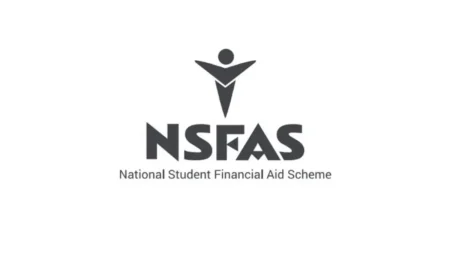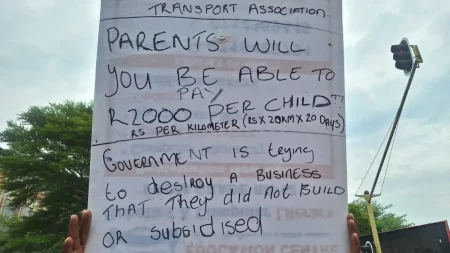The student housing crisis has reached a boiling point in South Africa, with widespread protests erupting at universities across the country. Thousands of students are struggling to secure accommodation, as university residences are full and the National Student Financial Aid Scheme (NSFAS) has been unable to deliver on its promises regarding private student housing.
The protests, which have led to disruptions in academic activities, have drawn attention to the failure of NSFAS’s accommodation platform, the exploitation of students by private landlords, and the broader systemic issues affecting student housing.
The Growing Housing Crisis at Universities
Universities across the country are struggling to provide housing for their students, as demand far exceeds the available supply. While some institutions have made efforts to increase the number of beds, many students are still left without a place to stay.
Students who rely on NSFAS for accommodation funding have been particularly affected. NSFAS introduced an online accommodation platform intended to streamline the process by allowing private landlords to register their properties for student use. However, the platform has been riddled with problems, leaving students unable to secure safe and affordable housing.
University of the Western Cape (UWC) at the Center of the Crisis
The University of the Western Cape (UWC) has been hit hard by the accommodation crisis. Hundreds of students have been forced to sleep in the university’s student center, as they are unable to find housing. First-year student Athini Mvelase, who traveled from the Eastern Cape, described the situation as “overcrowded, unsafe, and precarious.”
On Monday, more than a hundred students gathered in protest outside the university’s entrance, expressing their frustration over the housing situation. Security forces responded with rubber bullets, and at least one student was injured in the confrontation.
UWC spokesperson Gasant Abarder confirmed that all university-owned accommodation has already been allocated, despite the institution securing an additional 1,180 beds this year. The university is also reaching out to private accommodation providers to secure additional spaces for students in need. However, these efforts have not been enough to meet demand.
The Equal Education Tertiary Society (EETS), an activist organization, has criticized UWC’s response, arguing that the university’s claim of securing additional beds contradicts the reality faced by students on the ground. According to EETS, the closure of Cassinga Residence for renovations has made the situation worse, as students are being moved around with no clear housing strategy.
Widespread Protests Across the Country
The student housing crisis is not limited to UWC. Other universities across South Africa have also experienced disruptions due to student protests.
- Cape Peninsula University of Technology (CPUT): Classes and orientation sessions were canceled on Monday as students protested against housing shortages. Many students have been sleeping in common areas, waiting for accommodation to become available. Police used stun grenades and water cannons to disperse protesters.
- Nelson Mandela University (NMU): Protesters blocked campus entrances with burning tires. While there were no protests on Tuesday, classes were moved online, and shuttle services were suspended. Many students at NMU have not received their NSFAS allowances despite being approved for funding.
- Universities in KwaZulu-Natal and the Free State: Reports of protests and disruptions have also emerged from these provinces, as students struggle to find accommodation and receive their allowances.
Private Landlords Exploiting Desperate Students
Even for students who do manage to find private accommodation, the situation remains dire. Many landlords are demanding deposits or additional rental top-ups, which NSFAS does not allow. Some students have reported being placed in unsafe housing conditions, such as buildings with no hot water or accommodations located next to noisy nightclubs.
The Equal Education Tertiary Society (EETS) has warned that some private landlords are taking advantage of the crisis by charging “exorbitant fees” for substandard living conditions. This has placed additional financial strain on students, many of whom already struggle to cover their basic needs.
Humanitarian Organizations Step In
The Gift of the Givers humanitarian organization has stepped in to assist students affected by the housing crisis. The organization is providing blankets and hot meals to students at UWC, CPUT, and other Western Cape institutions.
“We have received many calls requesting assistance from students, parents, and human rights groups, as the students do not have access to food and water,” said Ali Sablay from Gift of the Givers. The situation has been described as a “brewing humanitarian crisis.”
NSFAS’s Failures and Corruption Allegations
The Organisation Undoing Tax Abuse (OUTA) has accused NSFAS of mismanaging the student accommodation system, describing it as a “ticking time bomb.”
In 2023, then-Minister of Higher Education Blade Nzimande reduced accommodation allowances from R60,000 to R45,000 per student per year. This decision further strained the already struggling student housing system.
NSFAS’s new online accommodation platform was meant to simplify the process, but it has proven to be dysfunctional. OUTA has raised concerns that NSFAS-appointed accreditation officers lack the skills to properly vet private accommodations, leading to delays, confusion, and corruption.
Additionally, NSFAS has failed to pay landlords for the accommodation provided in 2024, leaving many in financial distress. The Private Student Housing Association (PHSA), which provides 80,000 beds across the country, claims NSFAS owes its members R44 million in unpaid rental fees.
Last year, NSFAS was placed under administration due to allegations of corruption and mismanagement. CEO Andile Nongogo was dismissed following an investigation into irregularities in the student accommodation tender process.
OUTA Calls for Universities to Take Over Student Accommodation
Given NSFAS’s continued failures, OUTA is calling for universities and TVET colleges to take over the administration of student accommodation. According to OUTA, allowing universities to directly manage student housing would eliminate corruption, ensure better oversight, and provide students with safer and more reliable housing options.
Related: NSFAS Allowance Delays: What to Do If You Haven’t Been Paid
Government Response
Despite the growing crisis, NSFAS and the Department of Higher Education and Training have not responded to inquiries about their plans to address the situation. With protests escalating, students, activists, and education experts are demanding urgent action from the government.
The student housing crisis in South Africa has reached a critical point. With university residences full, NSFAS’s accommodation system in disarray, and private landlords exploiting students, many young South Africans are left struggling to secure safe and affordable housing.
The failure of NSFAS to effectively manage student accommodation has led to mass protests, class disruptions, and a growing humanitarian crisis. As calls for reform grow louder, the government must take immediate action to resolve the housing crisis and ensure that students can focus on their education without worrying about where they will sleep.
Source: Students disrupt classes amid housing crisis | GroundUp










